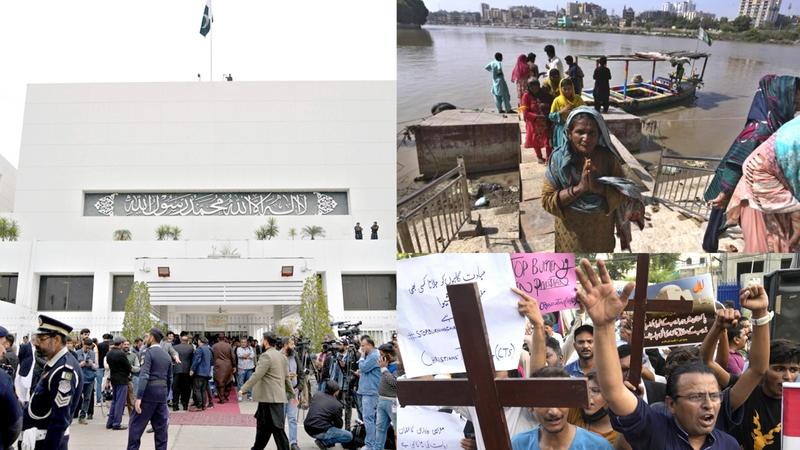Published 16:16 IST, March 4th 2024
77 Years On, A Non-Muslim Still Can't Be President or Prime Minister of Pakistan
The simple answer to this question is – no, in the current circumstances, Pakistan can neither have a non-Muslim Prime Minister nor a President.

Islamabad – After a long series of “wheeling and dealing” the newly constructed National Assembly of Pakistan elected the 24th Prime Minister of Pakistan on Sunday, Prime Minister Shehbaz Sharif made a comeback to the office once again, pledging to bring the struggling nation “back to the shore”. The country is also slated to witness the election of the President of Pakistan on March 9. The race for the presidential post is between former President of Pakistan Asif Ali Zardari and PTI-backed Pashtun nationalist leader from Balochistan Mehmood Khan Achakzai. However, an interesting question that emerges during this process is the fact that a non-muslim citizen of Pakistan can become the Prime Minister and President of the country.
The simple answer to this question is – no, in the current circumstances, the Islamic Republic of Pakistan can neither have a non-Muslim Prime Minister nor a President. The main reason for this is the country's constitution. The constitution of the Islamic Republic of Pakistan does not allow a non-Muslim individual to occupy either of the aforementioned offices even if he or she is a citizen of the country. The restriction is imposed in Article 41(2) of the constitution. “A person shall not be qualified for election as president unless he is a Muslim of not less than 45 years of age and is qualified to be elected as a member of the National Assembly,” the Article reads. Similarly, Article 91(3) stipulates that "after the election of the speaker and the deputy speaker, the National Assembly shall, to the exclusion of any other business, proceed to elect without debate one of its Muslim members to be the prime minister.”
Even the challenges to the law were discarded
In 2019, a bill was tabled by Pakistani lawmaker Naveed Amir Jeeva, that proposed that an elected non-muslim leader can run for both the offices. However, the country's national assembly rejected the bill. Jeeva, who proposed the legislation belonged to the Pakistan People's Party (PPP) and was a Christian politician who was serving in the parliament at that time. At that time, Jamaat-e-Islami (JI) member Maulana Abdul Akbar Chitrali appreciated the stance taken by the minister and stated that no law “against Islamic values and teaching can be passed, introduced or even debated in the parliament". The Assembly also assured that the minorities in Pakistan are enjoying complete freedom and security, and their rights are being protected. But is this really true in today's day and age?
The minority crisis in Pakistan
In the span of a few months, several places of worship belonging to the minority groups in Pakistan have been demolished by radical groups in the country. In August 2023, the authorities arrested 129 people who were involved in vandalising five churches in Faisalabad. Following this incident, Pakistan's Prime Minister Anwaar-ul-Haq Kakar vowed to “sternly” respond to any attacks targeting the religious minorities in the country. “The minorities, God willing, will stay protected in this country. There may be an attempt to harm them... that would be responded to sternly and strictly by the state and society both,” the prime minister said in the television address. However, the instances of violence against minorities have continued to rise at an exponential rate. In many of these instances, the radical mob have accused the minorities of committing blasphemy. It is important to note that blasphemy is punishable by death in Pakistan and though no one has ever been executed, victims have alleged that the mob used it as a tool to create a ruckus.
Updated 16:17 IST, March 4th 2024




